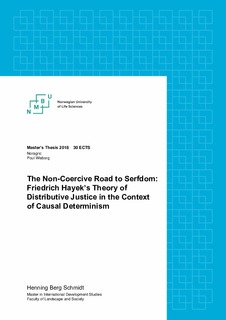| dc.contributor.advisor | Wisborg, Poul | |
| dc.contributor.advisor | Miles, James B. | |
| dc.contributor.advisor | Shanmugaratnam, Nadarajah | |
| dc.contributor.author | Schmidt, Henning Berg | |
| dc.date.accessioned | 2018-09-06T12:14:53Z | |
| dc.date.available | 2018-09-06T12:14:53Z | |
| dc.date.issued | 2018 | |
| dc.identifier.uri | http://hdl.handle.net/11250/2561238 | |
| dc.description.abstract | With so many conflicting conceptions of ‘development’, it seems important to find objective criteria to judge them by. The thesis proposes that it should be their alignment with normative ethics, where the question of free will holds great implications. This thesis is interested in how neoliberal political philosopher Friedrich Hayek’s normative stances on distributive justice remain their validity if causal determinism is true. By demonstrating why free will seems impossible and constructing a framework of distributive justice and normative ethics compatible with causal determinism, the thesis explores Hayek’s following normative stances compared to the framework developed in the thesis: 1) That the state ought to be nomocratic, 2) that the market due to its superior information processing and discovery-capacity contra the state, must be tasked with determining distributive patterns, 3) that the market distribution is exempt from claims of injustice, and 4) that the Hayekian order realizes a “philosophy of freedom”. The conclusion of the thesis is that none of the above seem valid without free will. The implications of such a finding is that determining distributive patterns ought to be enacted by a particular teleocratic state, and that causal determinism necessitates a significantly more intergenerational and egalitarian approach than is current practice. | nb_NO |
| dc.description.abstract | Med så mange uforenlige visjoner av ‘utvikling’ virker det viktig å identifisere obektive kriterier å bedømme dem på. Oppgaven foreslår at dette bør være hvor rett de har angående normativ etikk, hvor spørsmålet om fri vilje er sentralt. Oppgaven spør i hvilken grad Friedrich Hayeks teori angående sosial omfordeling holder vann om fri vilje er umulig. Ved å demonstrere hvorfor fri vilje virker umulig og konstruere et rammeverk for sosial omfordeling og normativ etikk basert på kausal determinisme, undersøker oppgaven følgende av Hayek normative posisjoner med utgangspunkt i rammeverket konstruert i oppgaven: 1) At staten skal være nomokratisk, 2) at markedet grunnet dets overlegne informasjonsprosseserings -og
oppdagelseskapasitet sammenlignet med staten bør få i oppgave å bestemme fordelingsmønstre, 3) at markedsfordelingen er imun mot kritikk angående dens urettferdighet, og 4) om Hayeks samfunn realiserer en frihetens filosofi. Oppgaven konkluderer at ingen av disse virker overbevisende uten fri vilje. Implikasjonene for et slikt funn er at sosial omfordeling bør overlates til en bestemt teleokratisk stat, og at kausal determinisme nødvendiggjør en langt mer egalitær tilnærming enn i dag, som inkluderer
fremtidige generasjoner. | nb_NO |
| dc.language.iso | eng | nb_NO |
| dc.publisher | Norwegian University of Life Sciences, Ås | nb_NO |
| dc.rights | Navngivelse 4.0 Internasjonal | * |
| dc.rights.uri | http://creativecommons.org/licenses/by/4.0/deed.no | * |
| dc.title | The non-coercive road to serfdom : Friedrich Hayek's theory of distributive justice in the context of causal determinism | nb_NO |
| dc.type | Master thesis | nb_NO |
| dc.description.version | submittedVersion | nb_NO |
| dc.source.pagenumber | 124 | nb_NO |
| dc.description.localcode | M-DS | nb_NO |

